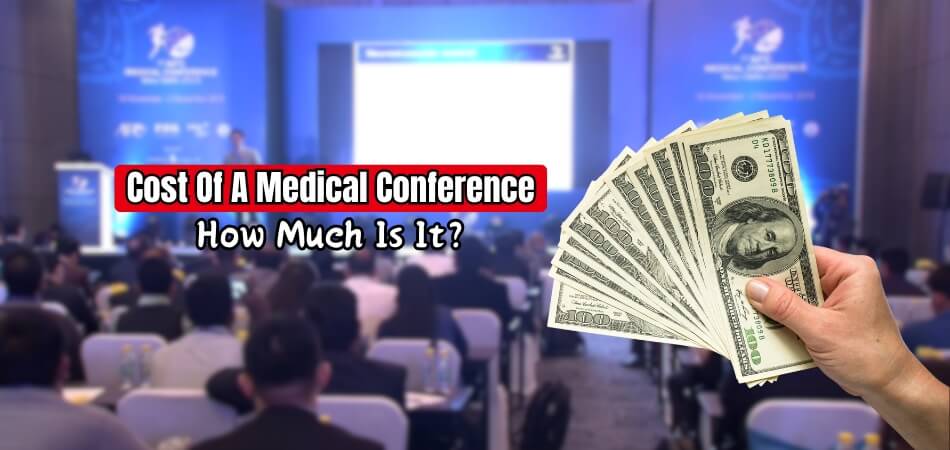Having the opportunity to engage in a medical conference can be an invaluable experience, allowing you to stay up-to-date on the latest advances and network with peers. These conferences range from small events to large international events, each providing unique learning and career development opportunities. However, one of the most common questions medical conference attendees have is, “How much does it cost to attend a medical conference?”
Costs of attending a medical conference can vary significantly, ranging from $500 to over $1,500, depending on factors such as location, duration, and whether the conference is national or international. These figures don’t include additional expenses like travel, accommodation, and meals, which can also add up.
Interested in budgeting for your next medical conference? Check out our detailed breakdown of costs and tips for making the most of your investment.
What Draws Attendees to Participate in a Medical Conference?
Taking part in medical conferences is a great way to enhance your skills in the healthcare field. These events are particularly appealing due to their structured yet dynamic nature, which offers both educational and networking opportunities. Here are some of the key factors that draw attendees to these conferences:
- Several networking opportunities are available, allowing professionals to build connections with colleagues and industry leaders.
- Continuing education is a major draw, especially with highly regarded workshops and seminars offered at conferences.
- During the event, attendees have the opportunity to learn about the latest developments in medical research.
- Conferences often feature keynotes from renowned experts, offering inspiration and professional guidance.
- Participating in a medical conference can strengthen a resume, demonstrating ongoing professional development and commitment.
- They are often set in cities or attractive locations, making them appealing travel destinations.
- Many conferences provide practical sessions, where attendees can gain hands-on experience with new techniques and technologies.
- These events also allow for the presentation of one’s own research, allowing professionals to be recognized and given feedback on their work.
Engaging in medical conferences like global healthcare conferences not only boosts professional knowledge but also provides immense networking opportunities in a global context. As healthcare continues to evolve, taking part in these conferences remains a central step for professionals who want to stay at the forefront of their field.
How Much Does It Cost to Attend a Medical Conference?
One can learn a lot by attending a medical conference, which will strengthen their professional skills and broaden their medical knowledge. However, attending a medical conference involves various costs. Typically, these conferences cost between $500 and $1,500. The variation in pricing is influenced by several key factors, which affect the overall cost of participation. Below are detailed explanations of this query.
Location
The conference’s venue plays an important role in determining the cost. Events held in major cities often have higher registration fees due to premium venue costs. Also, the destination’s cost of living can affect the price of accommodations and daily expenses.
For instance, Canada is known for successful international medical conferences. When you are planning to join international events like the Canada Medical Conference 2024, you should be expecting a higher cost margin that brings more advantages to your career. Tourism costs typically increase during large conferences as popular tourist destinations rise in price.
Duration
A longer conference means more expenses, not just for registration but also for hotel stays and daily meals. However, longer durations offer more in-depth exposure to new skills and networking opportunities, amplifying the benefits of attending medical conferences. Shorter events might seem cheaper but offer less comprehensive content and fewer networking opportunities.
Scope and Prestige
International conferences usually demand higher fees because they offer extensive, globally relevant content and speakers from around the world. The prestige associated with these events often justifies the higher cost.
Conferences at the national level may be less expensive, but they can still be very valuable since they focus on regional medical issues and advancements.
Speakers and Content
Costs can be greatly affected by the quality of speakers. Events featuring renowned experts and leading innovators in the field tend to charge more to cover their speakers’ honorariums. Moreover, conferences that offer advanced workshops or exclusive reveals of upcoming research or technologies may also have higher registration fees due to their unique offerings.
Additional Workshops and Certifications
Participation in specialized workshops or certification programs can add to the cost. These sessions often require additional fees but provide hands-on experience and learning that can be beneficial for medical professionals. They represent a significant value addition, especially for those looking to specialize further or update their skills.
Travel and Accommodation
Travel costs, especially for international attendees, can significantly affect the total conference costs. Choosing a budget hotel versus a luxury hotel can greatly affect the cost of accommodations. Early bird registration and discounts on hotel rooms can help reduce these costs.
How to Make the Most of Your Investment?
Attending a medical conference requires a financial commitment, so it’s important to maximize your investment. Here are some tips to ensure you get the most value from your experience.
Set Clear Goals
Before the conference, define what you want to achieve. This could include networking with peers, learning about new treatments, or attending specific workshops. Explore medical conference opportunities for nurses, doctors, medical students, etc. that align with your career goals. Having clear objectives will help you focus your time and energy during the event.
Engage Actively
Participate in sessions and discussions. Ask questions and interact with speakers and other attendees. Engaging actively will deepen your understanding of the topics presented. It also helps you build relationships that can benefit your career in the long run.
Take Notes
Bring a notebook or use your device to take notes during presentations. Jot down key points, ideas, and contacts you make. Reviewing your notes after the conference will reinforce your learning and remind you of important information. This practice will help you retain valuable insights and apply them in your work.
Network Strategically
Make the most of networking opportunities. Introduce yourself to other attendees, exchange contact information, and follow up after the event. Building a strong professional network can lead to new job opportunities, collaborations, and mentorship. Networking is an investment in your future, so approach it with intention.
Budget Preparation for Medical Conference
An effective budget for a medical conference requires careful planning and consideration. No matter what kind of event you attend, effectively managing costs ensures you gain the most educational and networking benefits without spending too much.
By adopting a structured approach, you can balance your finances efficiently. Here are the detailed explanations of this query:
Step 1: Evaluate the Total Costs
You should begin by listing all potential expenses, such as registration fees, travel, accommodations, and daily allowances. Estimate these costs accurately by consulting the conference schedule and details provided by reputable conference organizers. This holistic view will help you grasp the financial commitment required and assist in further budgeting steps.
Step 2: Choose Accommodations Wisely
Staying in the right place is essential for a successful trip. Compare different accommodation options considering price and proximity to the conference venue. Staying at a hotel suggested by the conference organizers might offer convenience and networking opportunities, even though it might cost a bit more.
Step 3: Plan Travel in Advance
Booking travel arrangements early can save you money. Look for discounts on flights and consider alternative travel options like trains or buses, which might offer lower rates. Also, coordinating travel with colleagues can further reduce costs through shared transportation.
Step 4: Allocate for Additional Expenses
Set aside a portion of your budget for additional costs such as meals outside the conference, transportation within the city, and emergency expenses. Having an emergency fund will ensure that unexpected costs do not disrupt your financial planning or focus during the conference.
Step 5: Monitor and Adjust Your Budget
Keep track of all expenses before, during, and after the conference. Review your spending against the budget periodically to make sure you are on track. This practice will help you manage unexpected costs and adjust your plans without compromising the overall conference experience.
Tips for Getting Financial Support to Attend a Medical Conference
Most professionals who want to expand their knowledge and skills need financial support so they can attend medical conferences. When you use the right strategies, you can find funding for registration, travel, and lodging. Here are some tips to help you get financial support for your next medical conference:
- Explore Professional Associations: Many professional associations offer grants or scholarships specifically for conference attendance. Check eligibility requirements and apply early to maximize your chances of receiving aid.
- Contact Conference Organizers: Reach out to the well-known conference organizers for information about financial aid. They often have resources or partnerships that can reduce costs for attendees.
- Utilize Academic or Workplace Funding: If you are employed by an academic institution or a healthcare organization, you may have access to professional development funding. This can include support or funding to attend international medical conferences, which can enhance your skills.
- Apply for Travel Grants: Look for travel-specific grants that cover flights and accommodation. These grants are often provided by scientific societies and educational foundations.
- Crowdfund Your Trip: Make use of crowdfunding platforms to raise funds for your conference expenses. This can be especially effective if you have a strong professional network or a social media presence.
- Seek Sponsorships: Local businesses or medical suppliers might be interested in sponsoring your trip in exchange for advertising or publicity at the event.
Frequently Asked Questions
Several factors affect the cost of attending a medical conference. Here are some common questions about the expenses associated with these events.
Are There Early Bird Registration Discounts Available?
Yes, many conferences offer discounted rates for early registration. Taking advantage of these discounts can significantly reduce overall costs. It’s important to keep an eye on registration deadlines to ensure you don’t miss out on these savings. Signing up early can also help you secure your spot before the conference fills up.
Do Conference Costs Differ Between National and International Events?
Yes, international conferences generally have higher registration fees due to travel and accommodation expenses, compared to national events that may be more localized. The overall cost can also include higher expenses related to meals and local transportation. Additionally, international events may offer different amenities that could affect pricing. Understanding these differences can help you plan your budget more effectively.
Can I Get a Refund if I Can’t Attend After Registering?
Refund policies vary by conference organizer. Many conference organizers offer partial or full refunds if you cancel before a certain date but always check the terms and conditions. Some may also offer credits toward future conferences if you cannot attend. Being aware of the refund policy can provide peace of mind when registering.
Do You Pay to Present at a Conference?
Yes, presenters often need to pay registration fees like other attendees. Some conferences offer discounted rates for presenters, but this is not always the case. It’s advisable to review the conference guidelines for specific policies related to presenters. Understanding these costs beforehand can help you prepare for any financial commitments.
Can You Attend a Medical Conference Without Presenting?
Yes, attending a medical conference without presenting is common. You’ll still need to pay registration fees and cover other expenses. Many attendees choose to learn from the sessions and network with other professionals in their field. This can provide valuable insights and connections, even if you are not presenting your own work.
Bottom Line
A complete assessment of the financial commitment associated with attending a medical conference is essential for effective budgeting. You must estimate your expenses and seek financial support to manage them effectively.
Making informed decisions helps you prepare better. Knowing “How much does it cost to attend a medical conference?” will help you do so. Factors such as location, duration, and prestige of the event significantly influence the costs, along with additional expenses like travel, accommodation, and meals.
With careful planning, these conferences become a valuable investment in your professional development. Their educational opportunities and networking opportunities improve your skills and expand your professional network, making the costs worthwhile.








